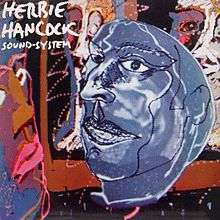Sound-System (album)
Sound-System is the thirty-sixth album by jazz pianist Herbie Hancock and the second of three albums with the Rockit Band.
| Sound-System | ||||
|---|---|---|---|---|
 | ||||
| Studio album by | ||||
| Released | January 1984 | |||
| Recorded | October–December 1983 | |||
| Genre | Electro-funk | |||
| Length | 33:53 | |||
| Label | Columbia | |||
| Producer | Bill Laswell/Material Herbie Hancock | |||
| Herbie Hancock chronology | ||||
| ||||
| Review scores | |
|---|---|
| Source | Rating |
| AllMusic | |
| Robert Christgau | A−[2] |
| The Rolling Stone Jazz Record Guide | |
Background
The second of the three Rockit band albums, Sound-System was another smash for Herbie Hancock. Winning his second Grammy award for Best R&B Performance (his second-straight award), this album tried to capture the success of the previous Future Shock, with some more twists and turns.
"Junku" for instance, featured Foday Musa Suso and also was written for the 1984 Summer Olympics in Los Angeles. It served as the "Field" theme. It also was used during Hancock's appearance on the long-running NBC Saturday Night Live.
"Sound System" sounded like "Junku" in many ways, while "Karabali" featured Wayne Shorter (playing a lyricon, instead of a traditional saxophone) and went back to the days of Hancock's African themed Mwandishi band.
Reception
Robert Christgau commented "Future Shock was a pretty good album despite its dink quotient; this is a better album despite its schlock quotient. Where's-the-melody is beside the point, because even when they're just hooks the melodies seem a little obvious, without the physical or intellectual bite of the rhythm tracks (nowhere mightier than on the amazing "Metal Beat," recommended to those who think Trevor Horn is into something heavy). And me, I doubt Herbie should be playing more "jazz"--several of the false moments here are provided by Saint Wayne Shorter himself. The African exotica of Foday Musa Suso and Aiyb Dieng, on the other hand, sounds right at home. As does the South Bronx exotica of D.St."[2] Richard S. Ginell of AllMusic noted "In the grand tradition of sequels, Sound-System picks up from where Future Shock left off -- if anything, even louder and more bleakly industrial than before... Hancock's electric music still retained its adventurous edge.[1]
Track listing
- "Hardrock" (Herbie Hancock, Bill Laswell, Derek Showard) - 6:10
- "Metal Beat" (Herbie Hancock, Bill Laswell) - 4:56
- "Karabali" (Herbie Hancock, Daniel Poncé) - 5:17
- "Junku" (Herbie Hancock, Bill Laswell, Foday Musa Suso, Aiyb Dieng) - 5:32
- "People are Changing" (Timmy Thomas) - 6:05
- "Sound System" (Herbie Hancock, Bill Laswell, Foday Musa Suso) - 5:55
Bonus Track from CD reissue
- "Metal Beat (Extended Version)" (Herbie Hancock, Bill Laswell) - 6:44
Personnel
Production
Band
- Herbie Hancock - piano, synthesizer, keyboards
- Bill Laswell - electric bass, drum programming, tapes
- D.S.T. - turntables, "FX"
- Nicky Skopelitis - guitar, electric drums
- Henry Kaiser - guitar
- Bernard Fowler - vocals, vocal arrangements
- Wayne Shorter - lyricon
- Toshinori Kondo - trumpet
- Anton Fier - drums, percussion
- Daniel Poncé - percussion
- Foday Musa Suso - percussion, kora, guitar, various instruments
- Aïyb Dieng - percussion
- Hamid Drake - cymbals
- Will Alexander - Fairlight programming
- Rob Stevens - programming
References
- Ginell, Richard S. (2011). "Sound-System - Herbie Hancock | AllMusic". allmusic.com. Retrieved 18 July 2011.
- Christgau, Robert (2011). "Robert Christgau: CG: Herbie Hancock". robertchristgau.com. Retrieved 18 July 2011.
- Swenson, J., ed. (1985). The Rolling Stone Jazz Record Guide. USA: Random House/Rolling Stone. p. 94. ISBN 0-394-72643-X.